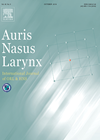
Journal Reviews
How common are swallowing problems in a general adult population?
This paper reports on the largest cross-continent study to date, looking at the prevalence of swallowing problems reported by adults in the community aged 18-65 years old. The authors used the Eating Assessment Tool (EAT-10) distributed via an online survey...
Stapedotomy in osteogenesis imperfecta
Osteogenesis imperfecta (OI) is a rare connective tissue disease caused by a defect in collagen structure. Hearing loss is a characteristic feature of OI. It typically presents with conductive hearing loss initially, followed by a superimposed sensorineural component later in...
Peer-support group for people with a hearing loss
Peer-support groups’ (PSGs) involvement in rehabilitation of people with different health issues can have a very positive impact on the patients’ wellbeing as showed in a various literature on the subject. This study involves analysis of data from previous studies...
Valsalva manoeuvre treatment of otitis media with effusion in adults
Otitis media with effusion (OME) is common in children but has a low prevalence in adults. There is some evidence to advocate middle ear inflation as a successful treatment for children with OME. This form of treatment is also recommended...
Tonsillectomy in or out?
Although tonsillectomy is the most common surgical act performed in ENT practice, there is still some concern about the safety of outpatient or day surgery scheduling, especially in adults. Although this has been common practice in many departments for some...
Differences between paediatric and adult cholesteatomas
An understanding of the differences between adult and paediatric cholesteatomas should be helpful in more effective management of the disease in children. In this study, the authors focused their comparison between paediatric and adult cholesteatomas to the operative findings, rates...
Intracranial complications of otitis media – the difference between kids and adults
Despite a decrease in intracranial complications from otogenic infections since the introduction of antibiotics, there is still morbidity and mortality associated with this. This group from the Netherlands conducted a retrospective review of all the patients treated for intracranial complications...
How do the rejected candidates for cochlear implantation feel?
This interesting study from the UK explored, using personal interviews, how rejected candidates for cochlear implantation feel and deal with the decision not to implant. The authors assessed 10 adult cochlear implant candidates who had undergone the evaluation process were...













